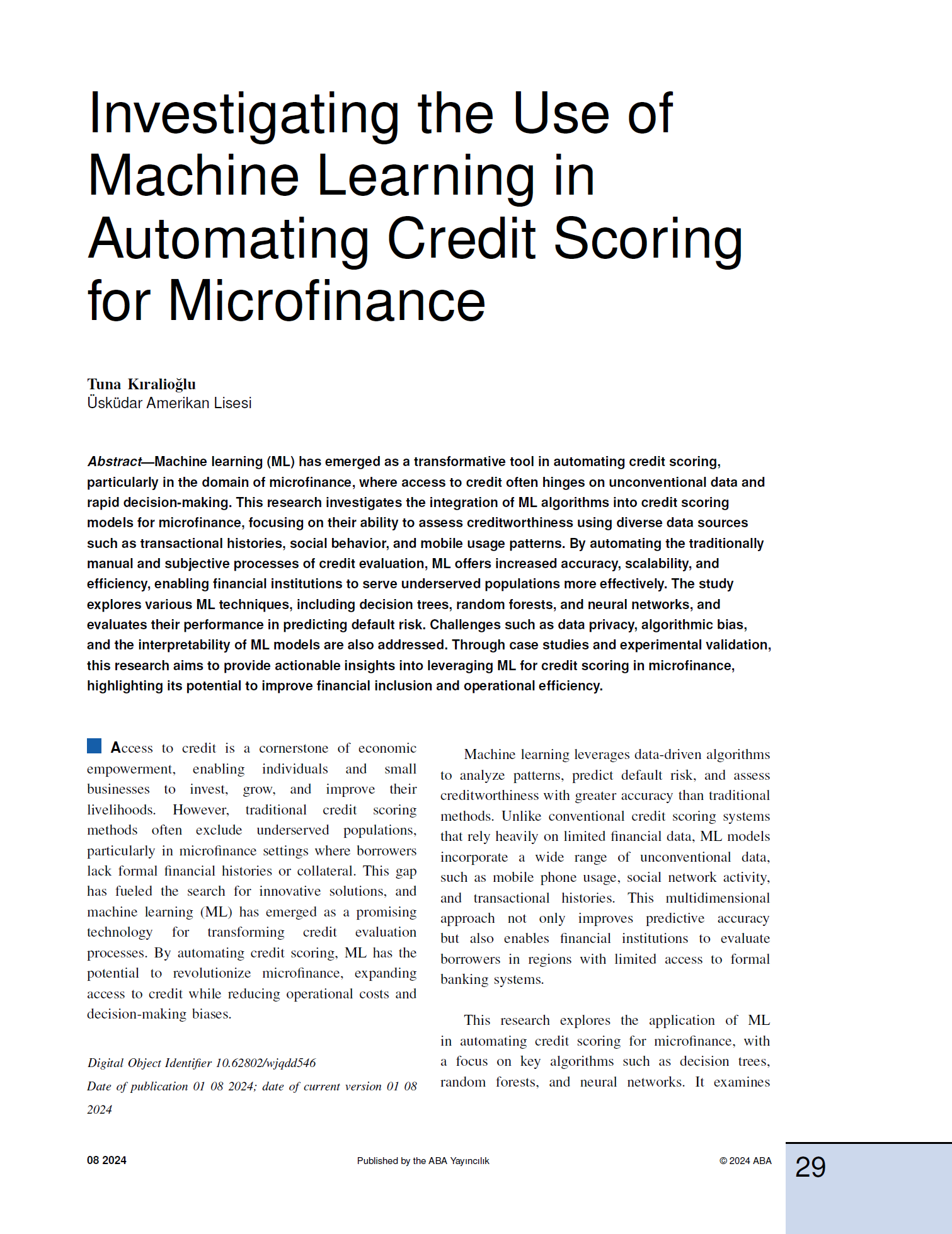Investigating the Use of Machine Learning in Automating Credit Scoring for Microfinance
DOI:
https://doi.org/10.62802/naerc319Keywords:
machine learning, credit scoring, microfinance, financial inclusion, automation, decision trees, random forests, neural networks, data privacy, algorithmic biasAbstract
Machine learning (ML) has emerged as a transformative tool in automating credit scoring, particularly in the domain of microfinance, where access to credit often hinges on unconventional data and rapid decision-making. This research investigates the integration of ML algorithms into credit scoring models for microfinance, focusing on their ability to assess creditworthiness using diverse data sources such as transactional histories, social behavior, and mobile usage patterns. By automating the traditionally manual and subjective processes of credit evaluation, ML offers increased accuracy, scalability, and efficiency, enabling financial institutions to serve underserved populations more effectively. The study explores various ML techniques, including decision trees, random forests, and neural networks, and evaluates their performance in predicting default risk. Challenges such as data privacy, algorithmic bias, and the interpretability of ML models are also addressed. Through case studies and experimental validation, this research aims to provide actionable insights into leveraging ML for credit scoring in microfinance, highlighting its potential to improve financial inclusion and operational efficiency.
References
Ali, S. H. Predictive Modeling in Microfinance: Enhancing Loan Approval Processes and Risk Management Using Data Mining Techniques in the Era of Digital Transformation in Egypt. Available at SSRN 4939105.
Demma Wube, H., Zekarias Esubalew, S., Fayiso Weldesellasie, F., & Girma Debelee, T. (2024). Deep Learning and Machine Learning Techniques for Credit Scoring: A Review. In Pan African Conference on Artificial Intelligence (pp. 30-61). Springer, Cham.
Dhawan, K. Exploring the Evolution and Impact of Microfinance in India: Developing Credit Scoring Models for the underbanked/unbanked.
Hlongwane, R., Ramaboa, K. K., & Mongwe, W. (2024). Enhancing credit scoring accuracy with a comprehensive evaluation of alternative data. Plos one, 19(5), e0303566.
Kazimoto, D., Baadel, S., David, D., Mutahaba, R., & Rugumyamheto, J. (2024, November). Tausi: A Holistic Artificial Intelligence Approach to Credit Scoring Using Informal Data for a Sustainable Micro-lending African Economy. In Proceedings of the Future Technologies Conference (pp. 67-76). Cham: Springer Nature Switzerland.
Kimani, G., Karani, J., & Mwangi, E. (2024). A Deep Learning Hybrid Model for Enhanced Credit Score Prediction.
Polin, J. A., Sarker, M. F. H., Dolon, M. D. K., Hasan, N., Rahman, M. M., & Vasha, Z. N. (2024). Predicting the effects of microcredit on women’s empowerment in rural Bangladesh: using machine learning algorithms. Bulletin of Electrical Engineering and Informatics, 13(4), 2699-2706.
Saxena, N., Thandayuthapani, S., Raman, P., ThirumaValavan, A., Behera, N. R., & Khatri, E. (2024, May). Machine Learning Techniques for Credit Scoring in Banking with Management, HR, and Organizational Key Components. In 2024 International Conference on Advances in Computing, Communication and Applied Informatics (ACCAI) (pp. 1-6). IEEE.
Shak, M. S., Uddin, A., Rahman, M. H., Anjum, N., Al Bony, M. N. V., Alam, M., ... & Pervin, T. (2024). INNOVATIVE MACHINE LEARNING APPROACHES TO FOSTER FINANCIAL INCLUSION IN MICROFINANCE. International Interdisciplinary Business Economics Advancement Journal, 5(11), 6-20.
Zhao, Y. (2024). Investigation of the Application of Machine Learning Algorithms in Credit Risk Assessment of Medium and Micro Enterprises. IEEE Access.


